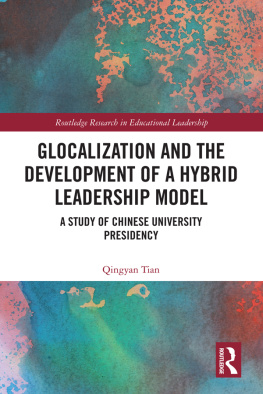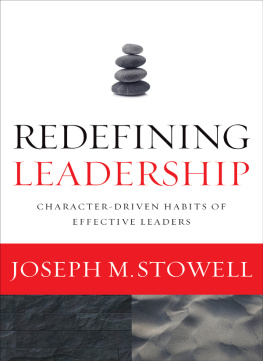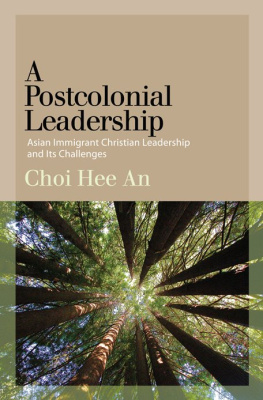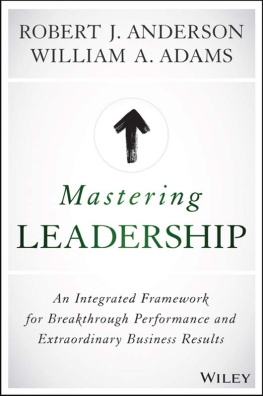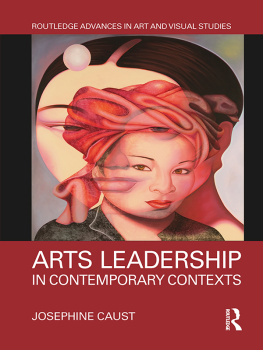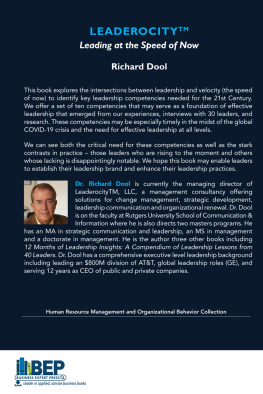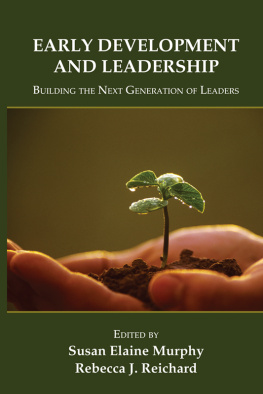This book emerges from research done for my doctoral dissertation, but no book is written alone. Many people have helped me along the way. As such, I acknowledge my dissertation committee from the University of Illinois at Urbana-Champagne (UIUC): Professor William Trent, Professor Jennifer Greene, Professor Nick Burbules, Professor Kern Alexander, Professor Dail Fields, and Professor Stanley O. Ikenberry for their guidance.
A number of experts in leadership studies, higher education, research methodology, and other fields in the United States and other countries, including several university presidents and chancellors, provided valuable guidance, for which I am very grateful: Fazal Rizvi, Robert Stake, Adrianna Kezar, Robert Birnbaum, Richard Morrill, Nathan Harter, the late Richard Couto, the late James Burns, Philip Altbach, Brian Earn, Joanne Ciulla, Mansour Javidan, Bruce Erickson, Roya Ayman, Karen Korabik, Michael Peters, John Sebastian, James Roach, Ray Lu, Brady Deaton, Richard Herman, and Joseph White. In addition, Dr. Stanley O. Ikenberry, Dr. James Underson, Dr. Richard Herman, Dr. James Roach, Dr. Huisheng Tian, Dr. Shuxing Li, Dr. Jianfeng Chen, and many others assisted me with gaining access to the participants.
I am also thankful to the International Association of University Presidents and several university presidents and senior leaders in China and the United States for their additional assistance in gaining access to participants. My special thanks go to the Chinese university presidents and other administrators, faculty, and students who allowed me to interview them.
I am grateful to my former students at Ocean University of China and Wei Jiang for their work in transcribing the data. I extend deep appreciation to Raymond Lou, James Roach, Bruce Erickson, David Klath, Keven Dolan, Mariahn Watkins, Amanda Rooker, and Ma Xin for their helpful editing of the book manuscript. My sincere thanks go to Bob Colvin for his consultation and editing. In addition, Christopher Newport University provided a generous faculty development grant to assist in the preparation of this final manuscript.
Lastly, I want to express special gratitude to my son, Runtian Bai, for his technological assistance, professional assistance (including data transcription and translation), and emotional and intellectual support throughout the project.

- Altbach, P. G. (2016). Global perspectives on higher education. Baltimore, MD: Johns Hopkins University Press.
- Altbach, P. G., Reisberg, L., & Rumbley, L. E. (2009). Trends in global higher education: Tracking an academic revolution: A report prepared for the UNESCO 2009 world conference on higher education. United Nations Educational, Scientific and Cultural Organization. Retrieved January 7, 2020 from https://unesdoc.unesco.org/in/documentViewer.xhtml?v=2.1.196&id=p::usmarcdef_0000183219&file=/in/rest/annotationSVC/DownloadWatermarkedAttachment/attach_import_997d3054-efca-41bc-8ede-79158454d4c0%3F_%3D183219eng.pdf&locale=en&multi=true&ark=/ark:/48223/pf0000183219/PDF/183219eng.pdf#%5B%7B%22num%22%3A59%2C%22gen%22%3A0%7D%2C%7B%22name%22%3A%22XYZ%22%7D%2Cnull%2Cnull%2C0%5D
- Altbach, P. G., Reisberg, L., & Rumbley, L. E. (2010). Trends in global higher education: Tracking an academic revolution (Global perspectives on higher education). Rotterdam: Sense Publishers.
- American Council on Education. (2002). American College President Study. Washington, DC: ACE.
- American Council on Education. (2012a). The ACE fellows program: The proven path to leadership. Retrieved March 23, 2012 from www.acenet.edu/Content/NavigationMenu/ProgramsServices/FellowsProgram/Apply/new_flyer.pdf
- American Council on Education. (2012b). Fellowship components. Retrieved March 23, 2012 from www.acenet.edu/Content/NavigationMenu/Programs-Services/FellowsProgram/AbouttheProgram/components.htm
- American Council on Education. (2017a). American College President Study. Washington, DC: ACE.
- American Council on Education (Ed.). (2017b). Mapping of the American internationalization. Retrieved April 15, 2020 from www.acenet.edu/Documents/Mapping-Internationalization-2017.pdf
- Antony, J. S., Cauce, A. M., & Shalala, D. E. (Eds.). (2017). Challenges in higher education leadership: Practical and scholarly solutions. New York: Routledge.
- Appadurai, A. (2006). Disjunction and difference. In B. Ashcroft, G. Griffiths, & H. Tiffin (Eds.), The post-colonial studies (2nd ed., pp. 468472). New York: Routledge.
- Aroson, J. (1994). A pragmatic view of thematic analysis. The Qualitative Report, 2 (1), 13.
- Ascough, R. S. (2002). Chaos theory and Pauls organizational leadership style. Journal of Religious Leadership, 1 (2), 2143.
- Audi, R. (2009). Nationalism, patriotism, and cosmopolitanism in an age of globalization. Journal of Ethics, 13 (4), 365381. Netherlands: Springer Netherlands.
- Avolio, B. J., & Bass, B. M. (1995). Individualized consideration is more than consideration for the individual when viewed at multiple levels of analysis. The Leadership Quarterly, 6 (2), 199218.
- Babbie, E. (2007). The practice of social research. Belmont, CA: Thomson Wadsworth.
- Bagshaw, M. (2008). Innocents abroad in the new millennium: How well does the American leadership model travel? In M. Harvey & J. D. Barbour (Eds.), Global leadership portraits of the past, visions for the future (Building Leadership Bridges Series). Silver Spring, MD: International Leadership Association.
- Bass, B. M. (1985). Leadership and performance beyond expectations. New York: Free Press.
- Bass, B. M. (1990a). Bass & Stogdills handbook of leadership: Theory, research and managerial applications. New York: Free Press.
- Bass, B. M. (1990b). From transactional to transformational leadership: Learning to share the vision. Organizational Dynamics, 18, 1931.
- Bass, B. M. (1997). Does the transactional-transformational paradigm transcend organizational and national boundaries? America Psychologist, 52, 130139.
- Bass, B. M., & Avolio, B. J. (1990a). Developing transformational leadership: 1992 and beyond. Journal of European Industrial Training, 14 (5).
- Bass, B. M., & Avolio, B. J. (1990b). The implications of transactional and transformational leadership for individual, team, and organizational development. Research in Organizational Change and Development, 4, 231272.
- Bass, B. M., & Avolio, B. J. (1990c). Multifactor leadership questionnaire. Palo Alto, CA: Consulting Psychologists Press.
- Bass, B. M., & Avolio, B. J. (1992). Multifactor leadership questionnaireshort form 6S. Binghamton, NY: Center for Leadership Studies.
- Bass, B. M., & Avolio, B. J. (1993). Transformational leadership: A response to critiques. In M. M. Chemers & R. Ayman (Eds.), Leadership theory and research: Perspectives and directions (pp. 4980). San Diego, CA: Academic Press.
- Bass, B. M., & Avolio, B. J. (1994). Improving organizational effectiveness through transformational leadership. Thousand Oaks, CA: Sage.
- Bass, B. M., & Riggio, R. E. (2006). Transformational leadership (2nd ed.). Mahwah, NJ: Lawrence Erlbaum.
- Bauman, Z. (1998). Globalization: The human consequences. Cambridge: Polity Press.
- Bellah, R. N., Madsen, R., Sullivan, W. M., Swidler, A., & Tipton, S. M. (1985). Habits of the heart: Individualism and commitment in American life

